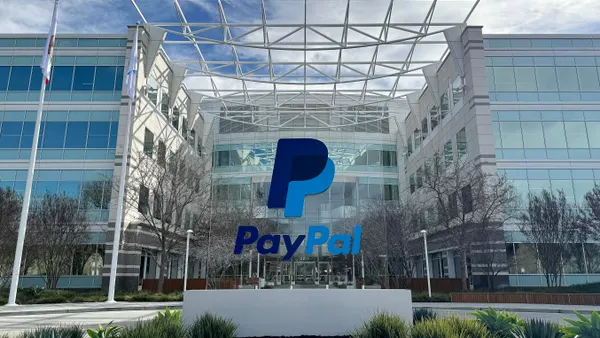Dive Brief:
- Digital payments company Block plans to spend about $160 million on compliance this year, more than five times what the company spent in that area in 2020, Chief Financial Officer Amrita Ahuja told analysts Thursday during a first-quarter earnings conference call.
- For Block’s peer-to-peer payments business, Cash App, the increase in compliance spending “has been even faster,” Ahuja added. A Block spokesperson declined to elaborate on Ahuja’s comment. San Francisco-based Block’s compliance expenses include personnel and software, Ahuja said. The Cash App business was the main target of a recent short seller’s report.
- Block executives said earlier this year they expect Cash App to grow faster than Block’s merchant business Square this year, and that was true in the first quarter.
Dive Insight:
The number of monthly active accounts on Cash App in March grew 15% year over year, to 53 million, Block said in its quarterly shareholder letter. That figure was also up 4% from December, when the company said Cash App had 51 million monthly active accounts.
For the first quarter, Block reported that its net loss narrowed to about $17 million, from about $204 million in the year-ago quarter. Net revenue jumped 26% to $4.99 billion. Bitcoin revenue accounted for a significant portion of the income, with first-quarter revenue excluding that revenue amounting to $2.83 billion, the company reported.
The March short seller’s report from the investment firm Hindenburg Research alleged Block inflated user metrics and permitted fraud in its Cash App business. Block responded the same day, calling the report “factually inaccurate and misleading.” The company also said it was exploring legal action against Hindenburg Research.
The following week, Block published a web post in which it defended how it measures active Cash App accounts, and how its compliance policies protect against fraud.
Block said Cash App is “built to support customers” who want multiple accounts, whether that’s separate business and personal accounts or various personal accounts. The company also said the vast majority of active accounts were connected to an identity the company had verified. The company has said that it’s also in the process of trying to verify the currently unverified accounts.
During Thursday’s call, JPMorgan Analyst Tien-tsin Huang noted his firm fielded “a lot of questions” related to the short report, and asked if that report had shifted the company’s priorities or strategy.
Block CEO Jack Dorsey said the company stands by its response. “We will not be distracted from our strategy and from our prioritizations,” he said.
Block’s business is “highly regulated,” Ahuja asserted. “Prioritizing compliance ultimately helps us drive trust with our customers, with regulators and external partners, and that enables us to then develop innovative products responsibly,” she said.
Cash App’s gross profit jumped 49% to $931 million for the quarter, and the number of monthly active customers using Cash App’s debit card in March rose 34% over the same period last year, to 20 million, the company reported.
Still, as inflation continues to bear down on consumers and the macroeconomic picture remains unclear, Block expects average spend per monthly active account to slow within Cash App, Oppenheimer & Co. Analyst Dominick Gabriele mentioned in a Friday note to investor clients. “We worry (Block’s) customer base could experience a spending shock,” he wrote.
Cash App has also faced scrutiny from the Consumer Financial Protection Bureau. That agency sued Block last August, accusing the company of “slow-walking” its responses to a Cash App-related probe by the CFPB, Reuters reported. In November, a federal judge ordered Block to comply with those investigative demands made by the CFPB.
In addition, Block has received demands for information from attorneys general in multiple states over Cash App’s handling of customer complaints and disputes, the company disclosed last year in its annual filing with the SEC.











